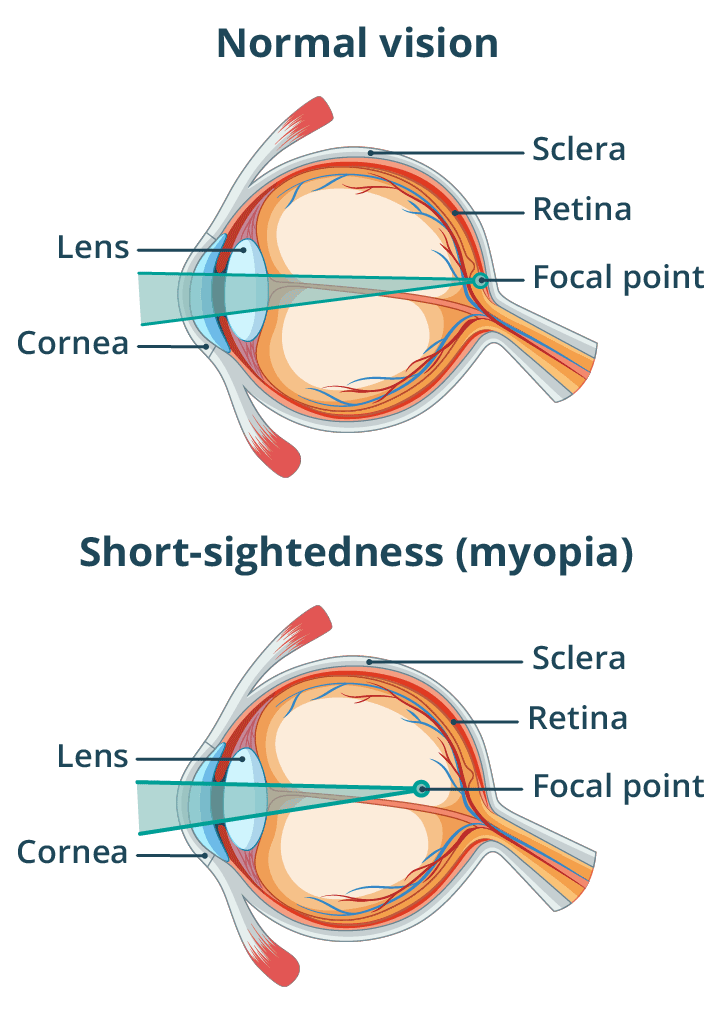Short-sightedness (myopia)
Key facts
- If you are short-sighted objects that are distant will look blurred.
- Short-sightedness is also known as near-sightedness or myopia.
- Myopia usually starts during childhood.
- It's due to an error in the way your eyes focus.
- Short-sightedness can be corrected by wearing glasses.
What is short-sightedness?
Short-sightedness (also known as myopia or near-sightedness) is a very common eye problem. If you are short-sighted, distant objects will look blurred. Myopia generally begins in childhood.
What causes short-sightedness?
Myopia is a type of refractive error. When light enters the eye, it's bent by the cornea (the clear layer on the front of the eye) and the lens.
If you have normal vision, the light waves are brought into focus on your retina, at the back of your eye.
If you are short-sighted, the light waves from distant objects focus in front of your retina instead. This is due to the size and shape of your eye. In some people short-sightedness can happen because your cornea has a different shape curve.


Short-sightedness usually appears in the pre-teen years and can get worse for a few years. It can also develop later — even in early adulthood. It's becoming more common.
Myopia has been linked to spending less time outdoors.
Short-sightedness is more likely if you often spend many hours doing close-up activities, such as:
- using a smartphone or other hand-held device
- using a computer
- schoolwork
- reading
You can also inherit short-sightedness from your parents.
What are the symptoms of being short-sighted?
If you are short-sighted, distant objects will appear blurred when you look at them.
You might notice that other people can see distant objects more clearly than you can. You might also get headaches or have difficulty driving.
Children might have difficulty reading the board in class or be reluctant to play outdoor sports. Your child might squint to see things at a distance, or they might sit very close to the television.
You might find your short-sightedness is worse at night.
When should I see my doctor?
If you feel that you or your child might be short-sighted, see your optometrist for an eye test.
How is short-sightedness diagnosed?
An optometrist or ophthalmologist can do an eye test using an eye chart to diagnose short-sightedness.
Children should have their vision checked when they start school. An eye test is also advised when starting high-school.
Even if you have no concerns about your vision, it's a good idea to have your eyes checked every 2 years.
How is short-sightedness treated?
An optometrist can help you can achieve good vision with prescription glasses.
Contact lenses can also be used in teens and adults. Laser refractive eye surgery is another option for adults.
Recent research suggests that certain treatments might be able to slow the progression of short-sightedness. If you want to know more about this, talk to your optometrist or doctor.
Can short-sightedness be prevented
Increasing the time spent outdoors may reduce the risk of short-sightedness in children. Some optometrists suggest at least 90 minutes outside play a day.
Resources and Support
The Good vision for life website can help you to better understand and care for your eyes.
You can also call the healthdirect helpline on 1800 022 222 (known as NURSE-ON-CALL in Victoria). A registered nurse is available to speak with 24 hours a day, 7 days a week.
Learn more here about the development and quality assurance of healthdirect content.
Last reviewed: September 2024











